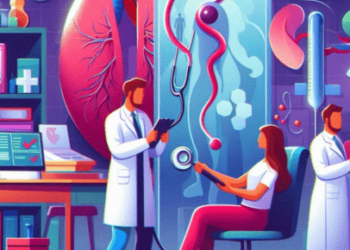
Irritable bowel syndrome (IBS) is a set of symptoms that impact your digestive system. It’s a common but uncomfortable condition that affects the intestines.
What are the major types of irritable bowel syndrome (IBS)?
IBS is categorized based on the appearance of your stools during symptom flare-ups. People with IBS typically experience normal bowel movements on some days and irregular ones on others. The type of irregularity on those days helps determine the kind of IBS.
IBS with diarrhea (IBS-D):
When your stool is mostly watery and loose.
IBS with constipation (IBS-C):
When your stool is mostly hard and lumpy.
IBS with mixed bowels:
When you stool is both hard and loose.
What are the symptoms and signs of irritable bowel syndrome?
Irritable bowel syndrome symptoms can show up often or only during flare-ups. This means you won’t always have irritable bowel syndrome symptoms. They may disappear, allowing for normal bowel movements, but can come back at other times.
The common irritable bowel syndrome symptoms can include:
- Severe gas and bloating
- Pain in abdomen with an urge to poop
- Constipation and diarrhea
- Spotting stool mixed with mucus
Consult the best gastroenterologist in Coimbatore if you are experiencing any of the mentioned symptoms.
What are the common triggers for irritable bowel syndrome?
IBS varies from person to person, but it can be helpful to monitor how you respond to common triggers and find ways to avoid them.
Triggers for constipation:
Certain foods can make IBS-related constipation, can include:
- Coffee and carbonated drinks
- Cereals and bread made with refined grains
- High protein foods
- Cheese
What are the best choices for constipation?
Slowly increase your fiber intake by 2 to 3 grams a day until you reach 25 grams per day for women or 38 grams for men. Great sources of fiber include whole-grain bread and cereals, beans, fruits, and vegetables.
- Consume foods with sugar substitutes in moderation.
- Drink enough water throughout the day.
Triggers for IBS diarrhea:
There are certain foods that might make diarrhea worse, that include:
- Drinks and foods with chocolate, caffeine, or alcohol.
- Eating large meals
- Fatty and fried foods
- Dairy products like milk or cheese
- Excess consumption of fiber
What are the best choices for diarrhea?
- Include a moderate amount of soluble fiber in your diet, as it helps bulk up stool. Good options are whole wheat bread, oats, barley, brown rice, and fresh fruits.
- Avoid having foods at different temperatures, like ice-cold drinks and hot soup, in the same meal.
- Stay away from broccoli, onions, and cabbage, as they can cause gas and worsen symptoms.
- Eat smaller portions, and drink water an hour before or after meals, rather than during them.
What are the anxiety and stress triggers for irritable bowel syndrome?
Stress and anxiety can worsen irritable bowel syndrome symptoms. Numerous factors can cause stress, such as:
- Problems at home
- Work
- Your travel
- Financial problems
How to manage your stress with the best tips?
- Adopt healthy habits by following a balanced diet that suits your IBS, staying active with regular exercise, and getting plenty of sleep.
- Indulging yourself in fun activities like reading or painting
- Learning different ways to calm yourself
- Talk to somebody who can support you
What are the complications of irritable bowel syndrome?
IBS is usually mild and can be managed with diet and lifestyle changes, but it can still affect your quality of life and be stressful to handle. Some people may also experience conditions like depression, anxiety, migraines, fibromyalgia, or chronic fatigue syndrome.
If IBS is making you feel sad, anxious, or overwhelmed, there are psychological support services designed specifically for IBS. Speak with your doctor to see if these services are suitable for you.
What is the procedure to diagnose irritable bowel syndrome?
The first step for IBS diagnosis is the medical history of the patient. Few questions can include:
- How common are your irritable bowel syndrome symptoms?
- Is there any pain during or before bowel movements?
- Have you seen any changes in your bowel movements?
- What kind of medications do you take?
- Are there any changes in the appearance of your bowels?
Depending on the medical history and physical examination further lab tests may be recommended.
Most lab tests help rule out other possible causes of your symptoms, such as infections, food intolerances, or other digestive conditions like inflammatory bowel disease (IBD). Not everyone will need the same tests.
Blood test:
To investigate a digestive disease or another condition that might be causing your irritable bowel syndrome symptoms.
Hydrogen breath test:
To check if you have too many bacteria in your gut or food intolerance.
Stool test:
To look for signs of infection or inflammation in your bowel that might be due to a digestive condition.
Can IBS be prevented?
Irritable bowel syndrome is a condition that does not have a definite cause so preventing IBS is not quite possible. But you can ensure to follow healthy eating habits that ensure to keep your digestive health safe.
Important Takeaway:
Irritable bowel syndrome can cause symptoms like diarrhea, constipation, and gas which can be comfortable and disrupt your daily life. However, IBS can be managed. You can reduce symptoms by adjusting your diet and daily habits to avoid triggers. If your stomach has issues that continue, reach out to the stomach specialist hospital in Coimbatore to seek expert advice.










